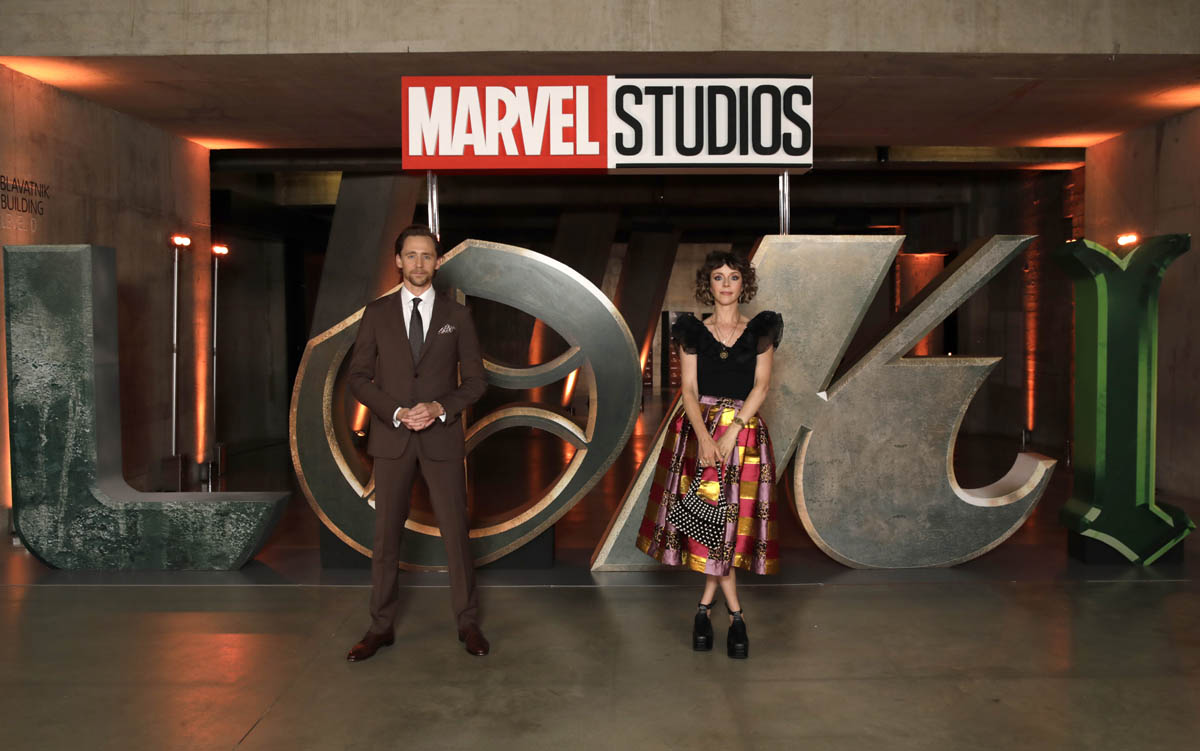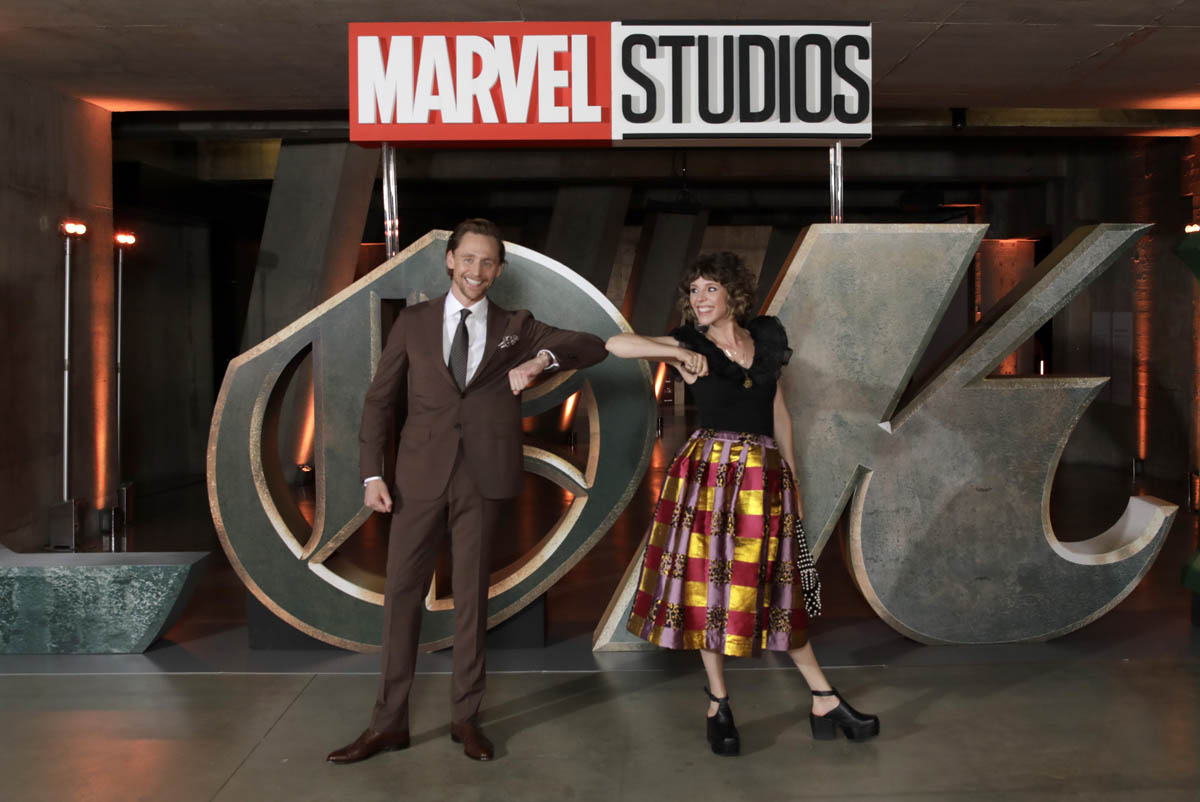Loki bursts out of the gate, ready to play



Spoilers
With the debut of Loki, Marvel is now three series deep into their new Disney+ series slate, and a shared complaint between the first two series, WandaVision and The Falcon and the Winter Soldier, is that they both got off to a slow start. Well, not so Loki. Compared to the previous series, it feels like someone strapped Loki to a rocket booster, which is ironic because between its first two episodes, Loki actually has the longest overall debut runtime of a Marvel series yet. But it knows from minute one what it is, what it’s doing, and who these characters are. The only slow-ish bit is the necessary recapping of the time heist from Avengers: Endgame, in which Loki (Tom Hiddleston) escapes from New York with the Tesseract in the chaos caused by the Hulk in Stark Tower. From there, Loki rockets forward and does not look back. Even when Loki is revisiting his greatest hits in the Marvel Cinematic Universe, it never feels like the show is looking back or wasting time. Every moment makes forward progress, even those in which Loki is confronted with his past, which literally involves playing clips from previous MCU movies, because of the rich inner life of Loki, something always hinted at but never explored in full. Now, though, we get to see Loki with his guts on display, and it’s not quite what is expected of a borderline cartoonish villain.
We’re dealing with the Loki of 2012, the entitled brat version bent on intergalactic domination because his daddy was mean. This is not the Loki who evolved and grew to a point where he was willing to sacrifice himself to save Thor, the brother with whom he had a complicated, jealousy-strewn relationship. Tom Hiddleston clearly has a lot of fun revisiting this version of Loki in episode one, which is directed by series director Kate Herron (Sex Education) and written by head writer Michael Waldron (a Rick & Morty alum who also wrote Doctor Strange in the Multiverse of Madness). But within mere minutes of his escape, Loki is apprehended and taken to the Time Variance Authority, the bureaucracy charged with managing the flow of space-time. Loki’s introduction to the TVA leans heavily on Terry Gilliam’s Brazil—though I also detect a whiff of Douglas Adams and the unrelenting tedium of the Vogons—for its wearying, pedantic version of intergalactic bureaucracy. (Jupiter Ascending had a similar riff, Loki does it better.)
The whole aesthetic of the TVA is delightful, a retro-futuristic mash-up of mid-century modern and sci-fi imagination. The Mad Men reference point is clear, but I am also reminded of Disneyworld’s Tomorrowland and the “Carousel of Progress”, a boring-ass ride no one has ever enjoyed, but I do remember that animatronic vision of the future that was all 70s orange and green but had VR headsets and robot butlers. The TVA has much the same look, as technology right out of 1967 is used in conventionally impossible ways, and everyone is dressed in bland brown suits, or vaguely Starship Troopers armor. (The production design is by Kasra Farahani, with costumes by Christine Wada.) This is far and away one of the MCU’s most visually interesting settings, but the Marvel house style’s flat lighting remains, and given the brown and orange palette of the TVA, it renders a lot of scenes particularly muddy.
At the TVA, Loki meets Mobius M. Mobius (a never better Owen Wilson), an “analyst” charged with finding and stopping a “variant”—a person displaced from the “sacred timeline”—who is killing TVA agents across time. To achieve his goal, Mobius makes a case for sparing Loki, who is now a variant, as the “real” Loki met his fate in 2018 at the hands of Thanos, and using him to hunt the spree-killing, time-jumping variant they can’t stop. Far from playing this as Hannibal Lecter and Clarice Starling, Loki delivers the buddy-cop chemistry that The Falcon and the Winter Soldier never quite achieved. Hiddleston and Wilson have such great chemistry that even expository scenes pop with energy. And that exposition is never burdensome to the tone or pace of the episode. It helps that Loki himself is our POV character, and we learn about the TVA and the “sacred timeline” as he does, but mostly it comes from how much context Waldron and Herron offload into visual cues and quick interactions between other characters. Like the pure, unadulterated OVER IT that every single TVA agent exudes toward Loki tells us everything that we need to know about their previous interactions with other Loki variants (Wunmi Mosaku pops up as a “hunter” who is particularly tired of any and every Loki’s sh-t).
The ambition of Loki lies in this concept of multiple Lokis existing across different timelines. Not only is Loki not THE Loki, he’s only A Loki, and being a Loki isn’t even that special. Mobius attacks Loki’s sense of self through his pride and egomania, tearing down the notion of his “glorious purpose” and what’s really behind it, but what wipes Loki out is the knowledge that he is just not special. And there Hiddleston starts carving out Loki 2.0, a character who, for the first time in a decade, actually feels like a trickster of mythology. Loki is clearly off-balance and thinking on his feet, maybe he’s three steps behind or ten steps ahead, it’s impossible to tell. What is clear is that he is remaking himself on the fly, he owns the title “God of Mischief”, he has a piercing sense of self-awareness, he is blighted by the knowledge of his own unspecialness, but he’s also freer than we’ve ever seen him.
Sure, he’s cut loose of Thor and Asgard and the Avengers, which helps open the character for new development. But it’s more than that. Loki, in his own context and with new energy from Hiddleston, seems his most mythic and mysterious. The plot—Loki time-travels to catch a murderous variant—is probably going to take up a lot of oxygen because nerds love nit-picking sci-fi concepts like time travel. There’s a time and a place for that, though I do think people get hung up on details like that when the story—the reason the plot is happening—isn’t really working. At least in its debut, though, Loki sets up a mightily intriguing story. What does a cosmically powerful, functionally immortal being who learns the pointlessness of his own existence do? What happens when you abandon your “glorious purpose”? Who do you become when you give up all the markers of who the world believes you to be? Loki throws out some huge questions right off the top and wastes no time digging into mythological themes of destiny and self-determination. I almost don’t care about the rogue variant—it’s pretty obvious who it is—because the potential in Loki’s remaking is so great. One episode in, Loki is a massive leap forward for Marvel television.






